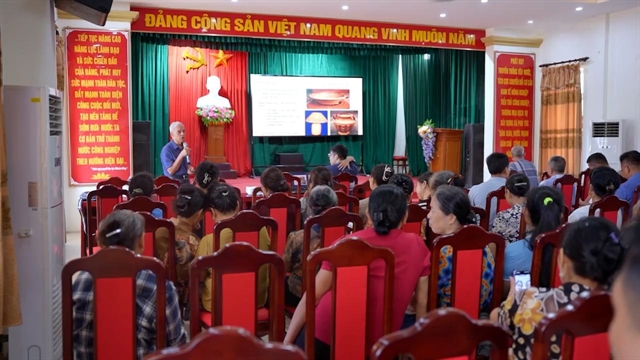 Economy
Economy

By Nguyễn Hà & Ngô Cường
 |
| Đinh Thị Tuyền promotes her village’s incense products via livestream on her smart phone. Photo laodong.vn |
As digital transformation sweeps across Việt Nam, even the most traditional craft villages are finding new life – and new markets – through smartphones, livestreams and social media.
On a sweltering July afternoon in Phượng Dực Commune on the outskirts of Hà Nội, Đinh Thị Tuyền stands under livestream lights, sweat on her eyebrows but energy high.
She’s showcasing her village’s incense products to an online audience, and orders are flying in. This midday livestream, a special session with discount offers, is a far cry from her first attempt, when nerves left her speechless on camera.
"We were only used to face-to-face sales," she said. "When we first tried livestreaming, we were awkward and nervous. But after training and repetition, it became second nature. At first, we only sold within the village. Now we get orders from much farther away."
Tuyền’s story reflects a quiet but powerful shift happening in rural Việt Nam.
With strong support from local authorities and the adoption of digital tools, handicraft people in Phượng Dực are learning to publicise their speciality products to audience nationwide. Revenue and profits in the village have grown significantly.
 |
| LOCAL INVOLVEMENT: Women are making incense coils in Phượng Dực Commune. Photos laodong.vn |
Since the country introduced a new two-tier government model, commune leaders have prioritised grassroots support. Local artisans like Tuyền now regularly attend workshops on digital sales, learning how to use platforms like Facebook and TikTok to promote their products.
Đặng Kim Thêu remembered how she closed four orders during her first livestream. Instead of giving up, the mother of three took every opportunity to learn.
Today, she runs her own small workshop making eco-friendly goods of reasonable price. Her livestreams now draw a growing and loyal audience.
"If we hadn’t had training, I wouldn’t have known how to run a livestream or even what to say to promote our products," Thêu said. "Now we speak smoothly and confidently. Everyone’s really excited."
Social media had also significantly expanded her customer base. She said that it had been very difficult to find buyers in the past, but she now could sell her goods in bulk to companies while still retailing them to local households.
Behind this transformation is Lê Văn Bính, secretary of the Communist Party of Phượng Dực Commune.
Previously the chairman of the former Phú Xuyên District, Bính is known not only for his administrative leadership but also for personally managing the Phú Xuyên Craft Village Facebook page, which boasts over 183,000 followers and official verification.
Bính has long believed in the power of digital technology to lift up local economies. When he began promoting digital transformation in 2023, the results spoke for themselves: e-commerce revenue in Phú Xuyên jumped from VNĐ147 billion (US$5.6 million) in 2023 to VNĐ1 trillion ($38.6 million) in 2024.
In the first five months of this year, that figure surged past VNĐ4 trillion ($152.6 million).
"The people entrusted me with this position, and I take that seriously. I’m not here just to hold a title," Bính said.
Appointed as Party Secretary of Phượng Dực under the city’s new administrative structure, Bính described his mission as both new and familiar.
"Now I lead more comprehensively, but my goal hasn’t changed; it’s still about serving the people," he said.
The urgency of that mission became clear in the wake of COVID-19, when local economies were struggling and craft villages were stagnating. Export markets had shrunk, and competition at home was fierce.
Bính responded by identifying three key priorities: apply digital technology and foster innovation, improve infrastructure to support trade and promote sustainable rural development.
 |
| IN THE KNOW: People in Phượng Dực Commune attend a workshop on digital sales, gaining hands-on skills in using social media to market their products. |
With city approval, he made the old Phú Xuyên a pilot district for digital transformation. The results were striking: the district rose from the bottom to the top of digital governance rankings in just over a year.
One key principle guided him throughout: digital transformation must be inclusive. He said that no one could be left behind, not even the elderly, and noted that their fanpage featured grandmothers in their seventies livestreaming and selling their products.
To make that happen, Bính personally invited university lecturers and marketing experts to provide free training for local residents. At first, villagers came out of curiosity. But with regular sessions, they gained the skills and the confidence to thrive.
Each week, the commune hosts classes on how to sell online using Facebook, TikTok, YouTube and Zalo. Many people learn to edit videos with CapCut and even write product descriptions using AI tools. These sessions are hands-on and practical, and they’re making a measurable difference.
"My goal isn’t just to report revenue figures," Bính said. "What matters is whether the training is really helping people improve their lives."
Bính has also taken inspiration from national policy, actively applying key directives on science, innovation and private sector development. After the commune was established, he formed a local steering committee to support small businesses and household workshops.
"I feel a real connection to this place," he said. "I treat it as my own hometown. I feel responsible for every single family. And when the people and my colleagues recognise our efforts, that gives me the motivation to keep going."
As Hà Nội’s new two-level local government model enters its first month, Phượng Dực Commune was emerging as a promising case study: a place where visionary leadership, community involvement and digital tools are coming together to build a more resilient rural economy.
Here, local officials don’t just administer policy. They walk with the people – and the results speak for themselves. VNS




